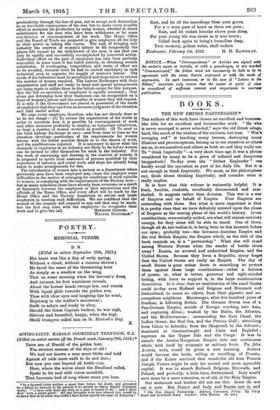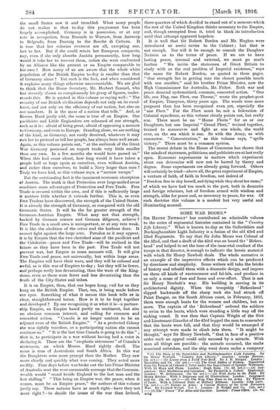BOOKS.
THE NEW EMPIRE PARTNERSHIP.• TEM authors of this work have chosen an excellent and business- like title for an excellent and businesslike work. " He who is never scourged is never schooled," says the old Greek adage, hard, like much of the wisdom of the ancients, but true. " Wares avenging rod " is teaching many lessons, destroying many illusions and preconceptions, forcing us to see ourselves as others see us, to see ourselves and others as both we and they really are. To " think Imperially "—a very short time ago it was a phrase considered by many to be a piece of inflated and dangerous braggadocio! To-day even the " littlest Englander" can hardly avoid the operation as part of his daily life. But it is not enough to think Imperially. We must, as the philosopher,' say, think about thinking Imperially, and consider what it really implies.
It is here that this volume is eminently helpful. It .is fresh, forcible, readable, excellently documented and mar- shalled. It suggests rather than dictates. This war is a war of Empires and on behalf of Empire. Four Empires are contending with three. But what is more important is that it is pretty clear that we have definitely entered upon the phase of Empires as the coming phase of the world's history. Groat combinations, economically united, are what will almost certainly emerge, for they alone will be able to stand. One of these, though all do not realize it, is being born at this moment before our eyes ; probably two—the Germano-Austrian Empire and the real British Empire, the Empire which, as the title of this book reminds us, is a " partnership." What else will stand among Western Powers when the smoke of battle clears away f Russia, an avowed and undoubted Empire, and the United States. Because they form a Republic, many forgot that the United States are really an Empire. The day of • small Staten is gone unless there is something to protect them against these large combinations—either a balance of power, or, what is better, generous and right-minded feeling, with force to support it, in the large combinations themselves. It is clear that no combination of the small States could to-day save Holland and Belgium and Denmark and Switzerland, to name no others, from their gigantic and un- scrupulous neighbour. Montenegro, after five hundred years of freedom, is following Serbia. The German dream was of a Pan-Gorman Empire, astride of Europe, reaching into Asia, and capturing Africa ; washed by the Baltic, the Atlantio, and the Mediterranean ; commanding the Suez Canal, the Indian Ocean, the Red Sea, and the Persian Gulf ; stretching from Calais to Salonika, from the Skagerack to the Adriatic; dominant in Constantinople and Cairo and Baghdad ; supreme on the Upper Nile and the Congo. It was to absorb the Austro-Hungarian Empire into one continuous whole with itself by economio or military force. To, Nix Austria, nube, would be given a new moaning. Austria
would become tho bride, willing or unwilling, of Prussia, and if the Kaiser survived that wonderful old man, Francis Joseph, Vienna might bo only his second and more agreeable capital. It was to absorb Holland, Belgium, Denmark, and Poland, and probably, a little later, Switzerland. Italy would once more be a mere extension, as of old, of the Holy Empire.
Our statesmen and traders did not see this. Some do not see it now. But France and Italy and Russia saw it, and • The New Empire Partnerskiy Defence, Commeroo, Polioy. By Percy Hurd and Archibald Hurd. London : John Murray. ids. net.1
the small States saw it and trembled. What many people So not realize is that to-day this programme has been largely accomplished. Germany is in possession, or at any rate in occupation, from Brussels to Warsaw, from Antwerp to Belgrade, from Dantzig to the Bocche di Cattaro. It is true that her colonies overseas are all, excepting one, lost to her. But if she could retain her European conquests, nay, even if she only absorbs Austria permanently, how long would it take her to recover them, unless she were confronted by an Alliance like the present or an Empire comparable to her own ? How many of us are aware that the whole white population of the British Empire to-day is smaller than that of Germany alone ? Yet such is the fact, and when considered it explains many things otherwise unaccountable. We are glad to think that the Home Secretary, Mr. Herbert Samuel, who has recently shown so conspicuously his grasp of figures, under- stands this. He is quoted in this volume as saying well : " The security of our British civilization depends not only on its excel- lence, and not only on the efficiency of our nation, but also on our numbers. It is the mass of a nation that tells." And, as Messrs. Hurd justly add, the same is true of an Empire. Our pacificists and Little Englanders are ashamed of our strength, such as it is : afraid of being great, afraid of appearing a menace to Germany, and even to Europe. Standing alone, we are nothing of the kind, as Germany, not easily deceived, whatever it may suit her to pretend or tell her people, has always been well aware. Again, as this volume points out, " at the outbreak of the Great War Germany possessed an export trade very little smaller than our own. In a few months she would have passed us." When this had come about, how long would it have taken a people half as large again as ourselves, even without Austria, and richer than ourselves, to build a Navy larger than ours ? Truly we have had, as this volume says, a "narrow escape."
But the outstanding fact is the imminent economic absorption of Austria. The truth is that Protection over large unified areas combines some advantages of Protection and Free Trade. Free Trade is secured within the area, and if this is sufficiently large it matters little whether it extends further. This is, as even Free Traders have discovered, the strength of the United States. It is already the strength of Germany, as compared with the old Germanic States. It will be the far greater strength of the Germano-Austrian Empire. What may not that strength, backed by German science and German diligence, achieve ? Free Trade in a small area is unimportant, or at any rate weak. It is like the abolition of the octroi and the harbour dues. It cannot fight against the large area. Paradox as it may appear, it is by Empire that the two cherished aims of the pacificist and the Cobdenite—peace and Free Trade—will be realized in the future as they have been in the past. Free Trade will not prevent war, but Empire in some measure will. It will give Free Trade and peace, not universally, but within large areas. The Empires will have their wars, and they will be colossal and awful, as is this war of Empires to-day ; but they will be fewer, and perhaps really less devastating, than the wars of the King- doms, even as those were fewer and less devastating than the feuds of the City-States and tribes.
It is on Empire, then, that our hopes hang, rnd for us they bang on the British Empire. That, too, is being made before our eyes. Something of what it means this book tells us in clear, straightforward terms. How is it to be kept together and developed ? By our recognizing it as what it is—a partner- ship Empire, an Empire based partly on sentiment, but also on obvious common interest, and calling for common and concerted action. " Canada is no longer content to be an adjunct even of the British Empire." " As a protected Colony she was rightly voiceless, as a participating nation she cannot continue so." " It is the last time Canada is going to do this " ; that is, to participate in a war without having had a voice in declaring it. These are the " emphatic utterances " of Canada's statesmen, on which Messrs. Hurd rightly dwell. The same is true of Australasia and South Africa. In this war the Daughters were more prompt than the Mother. They saw more clearly and quickly what was coming. They acted more swiftly. Four days before war broke out the late Prime Minister of Australia sent the ever-memorable message that the Common- wealth would " stand beside England to the last man and the last " This being an Empire war, the peace, when it comes, must be an Empire peace," the authors of this volume justly say. These nations have as much right—have they not more right ?—to decide the issues of the war than Ireland, three-quarters of which decided to stand out of a measurc which tha rest of the United Kingdom thinks necessary to the Empire, and, though exempted from it, tried to block its introduction until that attempt appeared hopeless.
It is well that Sir Robert Borden and Mr. Hughes were
introduced as amid curiae to the Cabinet ; but that is not enough. Nor will it be enough to consult the Daughter
Nations as to the terms of peace. If we are to have lasting peace, internal and external, we must go much further. " We invite the statesmen of Great Britain to study with us the real problem of Imperial existence," says the same Sir Robert Borden, as quoted in these pages. " Our strength lies in getting into the closest possible touch with one another," said his brother Prime Minister, now the High Commissioner for Australia, Mr. Fisher. Both war and peace demand systematized, common, concerted action. " Ono life, one Flag, one Fleet, one Throne," wrote the prophet-poet of Empire, Tennyson, thirty years ago. The words were more pregnant than has been recognized even yet, especially the "one Fleet." For the Fleet must be, not a federation of Colonial squadrons, as this volume clearly points out, but really one. There must be no " Home Fleets " for us or our Daughters, but one Imperial " Grand Fleet," trained together, trained to manceuvre and fight as one whole, the world over, on the sea which is one. So with the Army, so with commerce. " Concentration," as this volume says, " spells victory." There must be a common system.
The recent debate in the House of Commons has shown that the minds of statesmen, politicians, and publicists are at last really open. Economic experiments in matters which experiment alone can determine will now not be barred by theory and dogma. Some experiments are already going forward. Others will certainly be tried—above all, the great experiment of Empire, a venture of faith, of faith in freedom, not indeed of " Freedom free to slay herself, and dying while they shout her name," of which we have had too much in the past, both in domestio
and foreign relations, but of freedom armed with wisdom and strength, alike for peace and, as necessary to peace, for war. Of such doctrine this volume is a modest but very useful and illuminating manual.



































 Previous page
Previous page